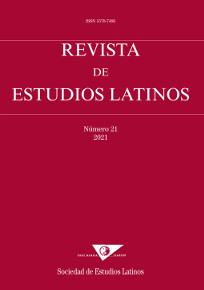Séneca el Viejo: sobre el género de la controuersia
DOI:
https://doi.org/10.23808/rel.v21i21.92718Palabras clave:
Seneca el Viejo; declamatio; controuersia; género; intertextualidadResumen
Séneca el Viejo en su obra Oratorum et Rhetorum Sententiae Diuisiones et Colores aporta mucha información sobre su concepción del género de la controuersia. El examen de Contr. 1 praef. 12 y de otros pasajes permite apreciar la importancia de los rasgos pragmáticos para la definición del género, por encima de los rasgos correspondientes al plano textual. Este panorama obedece a una lógica genérica situada en el nivel auctorial. Sin embargo, Séneca en su obra ha realizado una operación de escontextualización y recontextualización de los extractos seleccionados estableciendo entre ellos nuevas relaciones ajenas a la situación enunciativa original. El resultado es un desplazamiento de la relevancia del plano pragmático en favor de las relaciones intertextuales, entendidas en el sentido actual, como un fenómeno en el ámbito de la recepción y no en la alusión intencional. Esta circunstancia sitúa la obra como una recreación del género controuersia intencional. Esta circunstancia sitúa la obra como una recreación del género controuersia en la que Séneca, mediante distintas estrategias relacionadas con la práctica declamatoria, asume un papel protagonista como responsable de esta concepción en la que Séneca, mediante distintas estrategias relacionadas con la práctica declamatoria, asume un papel protagonista como responsable de esta concepción.
asume un papel protagonista como responsable de esta concepción.
Palabras clave: Seneca el Viejo; declamatio; controuersia; género; int
Descargas
Citas
Adiego, I. J. – Artigas, E. – Riquer, A. (eds.) (2005): Séneca el Viejo. vol I: Controversias. Libros I-V. vol. II: Controversias. Libros VI-X. Suasorias, Madrid, Gredos.
Beard, M. (1993): «Looking for Roman myth: Dumézil, declamation and the problems of definition», en Graf, F. (ed.), Mythos in Mythenloser Gesellschaft: Das Paradigma Roms, Berlin-Boston, De Gruyter, 44-64.
Berti, E. (2007): Scholasticorum studia. Seneca il Vecchio e la cultura retorica e letteraria della prima età imperiale, Pisa, Giardini.
Bonner S. F. (1949): Roman Declamation in the Late Republic and the Early Empire, Liverpool, Liverpool University Press.
Bornecque, H. (1967): Les déclamations et les déclamateurs d’après Sénèque le Père, Hildesheim, Olms. [1902]
Butler, S. (2002): The Hand of Cicero, London and New York, Routledge.
Cappello, O. (2020): «Nomination and Systematization in Seneca’s Controversiae» en Dinter, M. T., Guérin, C., Santos, M. M. (eds.), Reading Roman declamation: Seneca the Elder, Oxford, Oxford University Press, 87-111.
Fairweather, J. (1981): Seneca the Elder. Cambridge, Cambridge University Press.
Fernández Corte, J. C. – González Marín, S. (2013): «Escritura e historia literaria en el Brutus», Emerita, 81(1), 1–29. <http://emerita.revistas.csic.es/index.php/emerita/article/view/1035> [25/03/2021]. https://doi.org/10.3989/emerita.2013.01.1221.
Guérin, Ch. (2015): «Extraction, remémoration et discontinuité dans les Controverses de Sénèque le père: du déclamateur au texte», en Morlet, S. (éd.), Lire en extraits. Lecture et production des textes, de l’Antiquité à la fin du Moyen Âge, Paris, PUPS, 53-71. <https://hal.archives-ouvertes.fr/hal-01198453/document> [25/03/2021].
Guérin, Ch. (2020): «Greek Declaimers, Roman Context: (De)constructing Cultural Identity in Seneca the Elder», en Dinter, M. T.– Guérin, C.– Santos, M. M. (eds.), Reading Roman declamation: Seneca the Elder, Oxford, Oxford Univ. Press, 57-86.
Håkanson, L. (ed.) (1989): L. Annaeus Seneca Maior oratorum et rhetorum sententiae, diuisiones, colores, Leipzig: Teubner.
Hanslik, R. (1933): «Munatius 30», en Pauly, A.– Wissowa, G. – Kroll, W. (eds.): Paulys Realencyclopädie der classischen Altertumswissenschaft (RE). XVI,1, Stuttgart, Alfred Druckenmüller, 545–551.
Huelsenbeck, B. (2018): Figures in the Shadows. The Speech of Two Augustan-Age Declaimers, Arellius Fuscus and Papirius Fabianus, Berlin-Boston, De Gruyter.
Imber, M. A. (2001): «Practised Speech: Oral and Written Conventions in Roman Declamation», en Watson, J. (ed.), Speaking Volumes: Morality and Literacy in the Greek and Roman World, Leiden, Brill, 199-216.
Kennedy, G. A. (1972): The Art of Rhetoric in the Roman World, 300 B.C.–A.D. 300. Princeton, University Press, 1972.
La Bua, G. (2010): «Aiebat se in animo scribere (Sen. Contr. 1 praef. 18): Writing in
Roman declamations», en Calboli Montefusco, L. (ed.), Papers on Rhetoric X, Roma, Herder, 183-199.
Lockyer, Ch. (1970): The Fiction of Memory and the Use of Written Sources: Convention and Practice in Seneca the Elder and other Authors. Diss. Princeton University.
Dinter, M. – Guérin, C.– Martinho, M. (eds.) (2020): Reading Roman Declamation. Seneca the Elder, Oxford, Oxford University Press.
Migliario, E. (2003): «Orientamenti ideologici e relazioni interpersonali fra gli oratori e i retori di Seneca il Vecchio», en Gualandri, I. y Mazzoli, G. (eds.): Gli Annei, Una famiglia nella storia e nella cultura di Roma imperiale, Atti del Convegno Internazionale (Milano-Pavia, 2000), Como, New Press, 101-114.
Peirano, I. (2012): The Rhetoric of the Roman Fake: Latin Pseudepigrapha in Context. Cambridge, Cambridge University Press.
Peirano, I. (2013): «Non subripiendi causa sed palam mutuandi: Intertextuality and Literary Deviancy between Law, Rhetoric, and Literature in Roman Imperial Culture» The American Journal of Philology 134. 1, 83-100.
Peirano, I. (2019): Persuasion, Rhetoric and Roman Poetry, Cambridge, Cambridge University Press.
Roth, C. L. (ed.) (1871): C. Suetoni Tranquilli quae supersunt Omnia, Leipzig, Teubner.
Schaeffer, J.-M. (1989): Qu’est-ce qu’un genre littéraire?, Paris, Seuil.
Sinclair, P. (1994): «Political Declensions in Latin Grammar and Oratory 55 BCE/ CE 39», Ramus, 23 (1-2), 92–109. <https://www.cambridge.org/core/journals/ramus/article/abs/political-declensions-in-latin-grammar-and-oratory-55-bce-ce-39/07810C989CA44D0D2C111C7D56556A1A> [25/03/2021]. doi:10.1017/s0048671x0000240x
Spangenberg Yanes, E. (2012): «Discorsi già scritti e discorsi mai scritti: due distinte sfere di applicazione dei verbi recito e declamo», Res Publica Litterarum 35, 50-79. <http://digital.casalini.it/10.1400/229135> [25/03/2021]. DOI: 10.1400/229135
Steel, C. (2005): Reading Cicero: Genre and Performance in Late Republican Rome, London: Duckworth.
Sussman, L.A. (1978): The Elder Seneca, Leiden, Brill.
van Mal-Maeder, D. (2007): La fiction des Déclamations, Leiden-Boston, Brill.
Watkins, T. H. (2019): L. Munatius Plancus: Serving and Surviving in the Roman Revolution, London-New York, Routledge.
Descargas
Publicado
Cómo citar
Número
Sección
Licencia
Derechos de autor 2021 Revista de Estudios Latinos

Esta obra está bajo una licencia internacional Creative Commons Atribución-NoComercial-SinDerivadas 4.0.
Los originales publicados en las ediciones impresa y electrónica de esta revista son propiedad de las personas autoras de los mismos y se podrán difundir y transmitir siempre que se identifique la fuente original y la autoría en cualquier reproducción total o parcial de los mismos, y siempre que no tengan una finalidad comercial.






